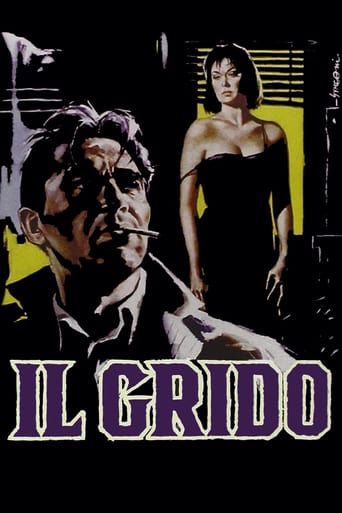Bob Taylor
Aldo's way takes him through the northern Italian region he knew in his youth. Gianni di Venanzo's photography is superb, capturing the bleak atmosphere of small towns: houses run down, cheap gas stations, a school in the middle of nowhere. There is nobody like Antonioni for portraying empty spaces leading nowhere.Aldo is as confused a character as one can find in European cinema. His life with Irma is over-she doesn't love him anymore-but he insists on moving on with his daughter. Elvia and her sex pot sister Edera offer no shelter to this man, who can't afford to bring up a child. He gets lucky, it seems with Virginia and her crazy dad at the gas station, but still he manages to alienate her. The last stop is a rundown shack with a prostitute. The four actresses--Alida Valli, Betsy Blair, Dorian Grey and Lyn Shaw--all play well. Steve Cochran at least has the advantage of a sturdy build even if his acting skills are limited.If Il grido is not as fine as L'avventura or Le amiche from the early period, it is still very good work.
bobsgrock
Films like Il Grido are nearly impossible to qualify or calculate on any real scale simply because they do not adhere to conventional rules of filmmaking. Michelangelo Antonioni's existential journey is very episodic in nature as we watch a self-contained man travel away from his lover in search of more fulfilling relationships after she turns down his marriage proposal. What follows may or may not make an emotional impact on the viewer as it is very languid pacing and tediously told. Antonioni fills the screen with endless long shots and long takes of the most desolate, empty and vast areas possible, especially for a country known to be so vibrant and fruitful as Italy. This seems to represent the protagonist's soul, his yearning for some sort of satisfaction that he cannot seem to grab a hold of. Despite the downtrodden mood of the film, it is a captivating journey, exploring the depths and lengths to which humans seek pleasure in any form. Of course, this assumes that pleasure is the right word.
Cosmoeticadotcom
So much attention has been paid to Italian director Michelangelo Antonioni's later New Wave films that his earlier Neo-Realistic films of the 1950s have been overlooked, as if the work of merely a talented tyro. But, even though he was not as consciously 'experimental' in those films as he was in the films of the L'Alienation trilogy (L'Avventura, La Notte, and L'Eclisse), and later classics like Blowup and The Passenger, his earlier films were visually well composed and well written films that both played upon the viewers' emotions and gave them believable characters and situations that could be related to. That Antonioni's filmic career started out working in the documentary format should not come as a surprise to those familiar with those earlier films.One of the best of those films is 1957's black and white Il Grido (The Outcry), which Antonioni also wrote, along with Elio Bartolini and Ennio de Concini. It's a nearly two hour long film that has much in common with Federico Fellini's 1954 classic La Strada, save that the film is a bit more believable and less patently heart-tugging. It also prefigures many of the themes that would recur in Antonioni's later work, such as alienation, apathy, and anomy, as well as possesses a political edge those later films lack.The lead character is a small town (actually crappy shacks and huts) Italian refinery worker and mechanical engineer named Aldo, played by American B film actor Steve Cochran, who is utterly believable as an Italian native. His reputation in this country was mostly in gangster films, but her he plays a member of the Italian Postwar proletariat, as the country is just on the verge of pulling out of its long economic slump. He has been having an affair with a sexy older blond woman named Irma, played by Alida Valli- most famed for her role in the 1949 film noir classic The Third Man, starring (and likely directed by) Orson Welles. Irma, though, is married, but her husband has been gone for almost seven years, working in Australia, thus letting Aldo squire her at will. The pair even have a young blond daughter together, named Rosina (Mirna Girardi)
. The film has been compared, in some circles, to the plays of Samuel Beckett, and this is one of the rare times that such comparisons are apt. No, even Antonioni's landscapes are not as bleak, nor his characters as satiric, as Beckett's, but much of the film is a physical journey to nowhere, for Aldo ends up back where he started, except having failed even more frequently. Il Grido is not as praised as much as Antonioni's later films, but it is better than the film that proceeded it, L'Avventura- which saw him break with his past totally, even if a failed break, and skirts near and above greatness. Only its rather abrupt, if appropriate, ending, can be argued against its greatness, just as Akira Kurosawa's Rashomon can be said to miss greatness only for its weak ending.Still, this film contains many moments that show how good a screenwriter Antonioni was, such as a shot of a man briefly entering Elvia's house, asking her out on a date- a movie or dancing, and her rejecting him casually- offering to go out on another Sunday evening. He cynically scoffs that her promise will be 'like every other Sunday.' In that brief scene, with a minor character- Elvia, and a small unnamed role, we know all we need to of Elvia- that she is still obsessed with Aldo, as we see her out dancing with him in the next scene, and that her hurt when she knows he is using her to forget Irma, is genuine. There is no need for a flashback on Elvia's past with either man, for that brief scene and comment sums it up with wonderful poesy and concision. Would more filmmakers learn the lessons that Antonioni did half a century ago, with Il Grido, and more of them would produce films of quality, and a few would augur great art. Ah, perchance to
DICK STEEL
For those who've been attending the Retrospective religiously, one of the best bits during the screening is the introduction to each movie as presented by Lorenzo Codelli, where he shares some little known facts of the movie with the audience. Today we were told that Monica Vitti actually was featured in Il Grido, not in person though but providing the dubbed voice behind Dorian Gray's character Virginia. So their collaboration stretched further back, even before L'Avventura.The story centers on a working class sugar refinery worker Aldo (American actor Steve Cochran) who we learn has waited for 7 years cohabiting with Irma (Alida Valli), whose husband had recently passed away while in Australia. Thinking that this is a blessing in disguise in that he can finally marry Irma, Aldo gets the biggest surprise when he learns that the love of his life had in the last 4 months, given her heart to someone else. In rage he dished out unforgivable physical violence in public on her, and with a broken heart, picks up his daughter Rosina (Mima Girardi) to embark on an aimless road trip, wandering all over Po valley (which was the subject of one of Antonioni's early documentary).Shot in the great outdoors, there's always a lingering mist in the first half of the movie, as if to accentuate Aldo's state of uncertainty and blur in his current state of life, without a clue what lies ahead as he drifts from location to location, and from person to person, as if like a person on a rebound, latching onto every opportunity that present itself to him, but all this while having absolutely no plans and unsure of what to do. While he seeks out his first love Elvia (Betsy Blair) and there comes this speed boat race, I thought Il Grido really picks up when he wanders toward a highway petrol kiosk, and meets with Virginia (Dorian Gray) and her alcoholic aged father (played by Guerrino Campanini).Romancing the lady boss for food and lodging, having his daughter at his side demonstrated in truth that his relationship with and welfare for his daughter takes precedence over everything else, so while on the surface he might seem aimless, deep down he still bears a sense of responsibility to provide for Rosina, which probably gave him an invisible guiding hand in what he was doing, until of course he clinically evaluated and decided otherwise.As he goes from woman to woman, having short temporal relationships with everyone we see on screen from Elvia to Andreina (Lynn Shaw), each played out like small skits, but a common thread running through it is that the characters here seem to be people who have wasted away their prime, missed the boat and are holding out for one last possibility at true love and happiness. Irma found hers although at Aldo's expense, and everyone else demonstrated memories with loved ones whom they cannot forget. The ending is nothing less than heart- wrenching, a discovery and affirmation of sad truths when people indeed have moved on, but then you realize that insofar you're still stuck in a rut. Very depressing if you ponder over it.The last act also dwelt on impending change, with landscape changes ordered from the top, with common people on the ground being forced to accept these changes, with little regard to their livelihood. I thought it provided a poignant moment to reflect upon such frenzy, and sometimes the insensitivity that comes together with forced policies probably, and hopefully for the greater good.



 AD
AD



